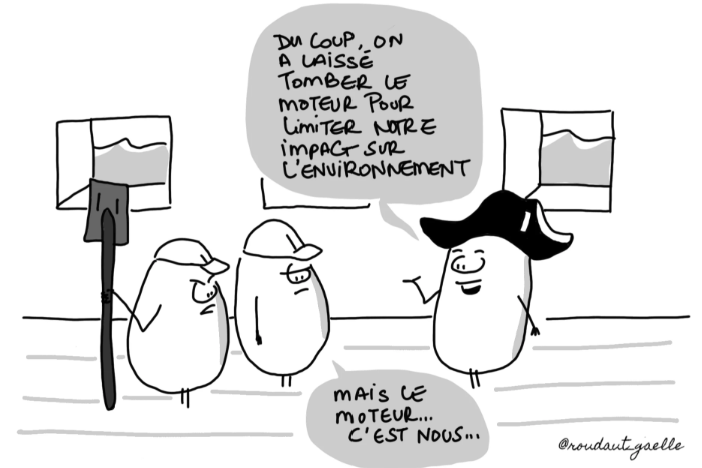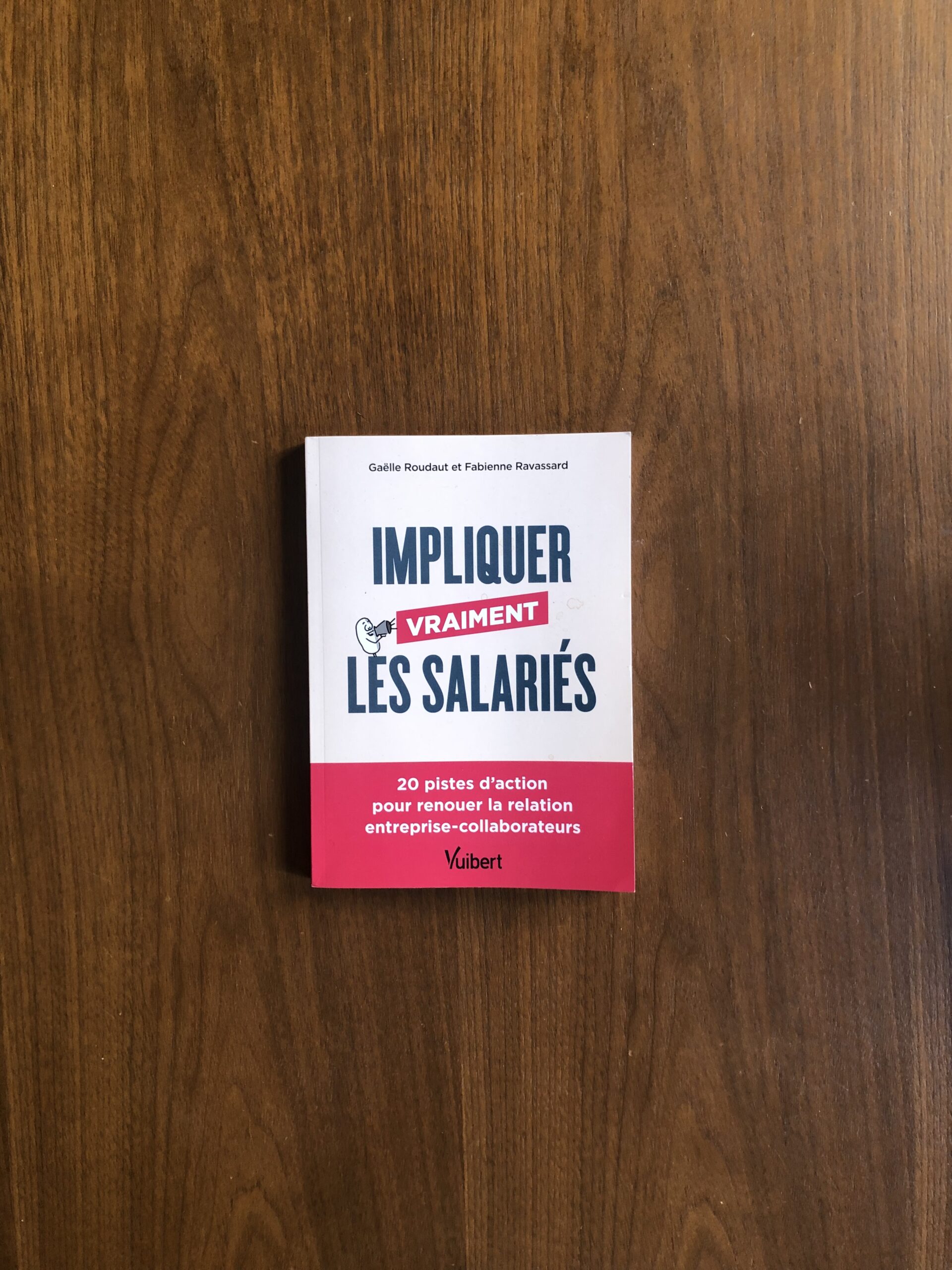- Ideas
TO GET EMPLOYEES ENGAGED, THE COMPANY MUST COMMIT!"

20 July 2022

We know that employee engagement is a key issue for managers because it is intimately linked to performance and, let's face it, meaning at work.
Alors, quels leviers activer pour « impliquer vraiment les salariés » ? C’est justement la question à laquelle Gaëlle Roudaut et Fabienne Ravassard répondent dans leur livre au titre éponyme, sorti récemment et publié aux éditions Vuibert.
Gaëlle, nous la connaissons bien, après avoir été consultante chez Arctus, elle collabore toujours régulièrement avec notre équipe, sur des sujets de transformations digitales internes, de conduite du changement, et d’employee advocacy.
THE COMPANY FACING ITS RESPONSIBILITIES
L’ouvrage en question secoue les idées reçues. Prenons de la hauteur : pourquoi une entreprise s’attendrait à ce que ses employés s’engagent pour elle alors qu’elle-même ne s’engage pas à les impliquer vraiment ?
Les auteures, en 10 chapitres et de nombreuses illustrations de Gaëlle – elle est aussi facilitatrice graphique – décortiquent ce qui fait et défait la relation entreprise-collaborateurs et rappellent la responsabilité des organisations, aux niveaux des directions, à créer les conditions de l’engagement. Car rappelons-le : l’engagement ne fait pas bon ménage avec l’injonction ! On ne peut forcer un salarié à l’être, comme on ne peut le forcer à avoir confiance ou à être motivé.
L’affaire, bien sûr, est plus complexe mais le postulat de départ pour faire de ses collaborateurs des acteurs engagés est simple : pour que l’entreprise engage, il faut qu’elle incarne elle-même l’engagement ! Comment ?
A la lecture du livre, j’y vois 2 moyens indissociables :
- par la posture, les valeurs et les ambitions qu’une entreprise, une direction, un manager portent et communiquent auprès de leurs collaborateurs
- par les actions concrètes qu’ils mettent en place et leur font vivre au quotidien.
Loin d’être un concept tendance et sans fond, l’engagement se pense, s’organise et exige stratégie, investissement et suivi.

COMPANY AND EMPLOYEES: A SUBTLE PARTNERSHIP THAT NEEDS TO GROW
Alors quels sont les fondamentaux de la relation entreprise-collaborateurs qui nous permettent de penser que tout est permis pour imaginer un partenariat solide et équitable ?
Les auteures partent de leurs expériences et constatent les décalages entre les attentes d’une organisation qui attend beaucoup et la réalité telle que perçue par des salariés désillusionnés et en quête de sens. Les sections « C’est du vécu » qui jalonnent le livre, racontent avec humour des situations cocasses vécues dans les entreprises. Nombreux sont les exemples de gestion de projets de transformation mal ficelés, incomplets qui mettent à mal la dynamique d’équipe, la confiance et la motivation.
On ne peut s’empêcher de se replonger dans nos propres expériences . On se dit alors que la tâche est grande pour réengager et réembarquer les équipes… et que c’est peut-être aussi pour cela que l’on aime notre métier 😉
Les rappels théoriques proposés par les auteures nous invitent à prendre du recul sur ce monde complexe et toujours fluctuant. Il aide à s’interroger sur le rôle de chacun, quel que soit son rôle dans l’organisation, et les leviers pour aborder le changement avec pragmatisme et humilité.

LEVERS FOR GETTING INVOLVED TOGETHER
Le périmètre d’actions est vaste pour embarquer, motiver les équipes et faire des salariés des individus et des collectifs plus engagés.
On retrouve, dans le livre, les leviers de la conduite du changement : écouter le terrain et adopter le point de vue des salariés, répondre à tous les besoins, encourager les initiatives des managers de proximité, accompagner, communiquer, valoriser les collaborateurs, et surtout, proposer un nouveau cadre de coopération où écoute, apprentissage, autonomie, créativité et responsabilisation prévalent.
Gaëlle et Fabienne proposent une vingtaine de pistes d’action, concrètes, pragmatiques, accessibles pour peu que l’on soit convaincu que, dans une organisation, tout le monde détient une part de solution.
Entre intelligence collective, culture du feed-back, innovation participative et environnement de travail digital coconstruit, ce livre offre aux entreprises et aux décideurs une véritable boîte à outils pour orchestrer l’écoute, le partage et la coconstruction, rebooster la confiance en soi et celle des autres. Autant d’opportunités pour retrouver la joie de mener des projets et de créer ensemble, que l’on soit managers ou managés.

THE 8 KEY SUCCESS FACTORS FOR A SUCCESSFUL INTERNAL TRANSFORMATION
Ce que la lecture de cet ouvrage nous inspire, chez Arctus, c’est que le succès d’un projet de transformation interne est conditionné par l’implication et l’action de l’ensemble de ses parties prenantes. Ce succès repose sur 8 éléments clés :
- L’écoute des besoins de l’ensemble des parties prenantes, à toutes les strates de l’organisation, de la direction aux directions métiers et transverses, des managers de proximité aux des utilisateurs et agents terrain, des référents aux ambassadeurs, des déconnectés du numérique aux réfractaires au changement…
- L’alignement entre les besoins et l’ambition de chacun
- Le partage d’une vision commune
- La mise en place d’une méthode pour avancer ensemble, pas-à-pas
- Le choix d’outils adaptés et évolutifs
- La mise en action, au-delà des paroles, celle qui mène au changement
- Les tests et les itérations
- La communication pour préserver la transparence, valoriser les acteurs et développer la cohésion
Merci à Gaëlle Roudaut et Fabienne Ravassard de nous les rappeler !
« Impliquer vraiment les salariés » par Gaëlle Roudaut et Fabienne Ravassard, aux éditions Vuibert, mars 2022 »
#conduite_du_changement #engagement
#transformation #travail_hybride


